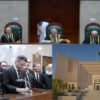ISLAMABAD:The Supreme Court of Pakistan accepting the Pakistan Tehreek-e-Insaf petition has annulled the verdict of the Peshawar High Court while saying that the Election Commission of Pakistan decision is against the constitution.
The verdict has been given with the majority of 8 judges.The verdict was supported by Justices Athar Minallah, Shahid Waheed, Muneeb Akhtar, Muhammad Ali Mazhar Ayesha Malik, Syed Hassan Azhar Rizvi and Irfan Saadat Khan also ruled in favour of the PTI.
The SC also annulled the verdict of March 2 decision of the ECP saying that the ECP wrongly interpreted the SC verdict regarding the election symbol.
The SC ordered read by the CJ said that not getting the election symbol by the political party doesn’t stop it participation in the elections. The PTI was a political party and still is the party. The verdict said that the PTI fulfills all requirement of a political party, the CJ said by pronouncing the verdict.
The SC order said that the Pakistan Tehreek-e-Insaf has rightful in its demand to be given special seats in the NA and the provincial assemblies.
The order also asked the PTI elected members to submit affidavits describing that they are the members of the PTI while such members who have already given the affidavits will remain same.
Chief Justice of Pakistan Justice Qazi Faez Isa pronounced the verdict while the CJ apprised that Justice Mansoor Ali Shah penned the verdict.
The court ordered that to give women and minorities special seats to the PTI. The verdict also ordered the PTI to provide lists of its members list within 15 days of this verdict.
On the other hand the SC rejected the appeal of SIC saying that the SIC can’t get special seats according to the constitution.
The verdict apprised that the ECP provided list of 80 people out of which 39 belonged to the PTI.
Justice Yahya Afridi has written a descending note in the case.
The development came after the apex court’s full bench held its second round of consultation on the reserved seats case verdict for the second consecutive day on Thursday.
A special session of the country’s top court’s 13-member full bench was held under the chair of Chief Justice of Pakistan (CJP) Qazi Faez Isa, the sources said, adding all the judges of the bench attended the session.
The apex court reserved the verdict on the SIC’s appeals on Tuesday after conducting nine hearings on the SIC’s appeals with all parties including the federal government and the ECP presented their arguments against the SIC’s plea.
The full bench also comprises Justice Syed Mansoor Ali Shah, Justice Muneeb Akhtar, Justice Yahya Afridi, Justice Amin-ud-Din Khan, Justice Jamal Khan Mandokhail, Justice Muhammad Ali Mazhar, Justice Athar Minallah, Justice Syed Hassan Azhar Rizvi, Justice Ayesha Malik, Justice Shahid Waheed, Justice Irfan Saadat Khan and Justice Naeem Akhtar Afghan.
The reserved seats’ issue first arose after over 80 PTI-backed independent candidates emerged victorious in the February 8 elections and subsequently joined the SIC in a bid to claim seats reserved for minorities and women.
However, the Imran Khan-founded party suffered a setback after the ECP, citing the party’s failure to submit its list of candidates, denied allocating the reserved seats to the SIC.
The party then approached the PHC which upheld the electoral body’s decision on the matter.
Subsequently, the SIC moved the apex court seeking to set aside the PHC verdict and the allocation of 67 women and 11 minority seats in the assemblies.
It is also to be noted that the PHC verdict allowing the allocation of reserved seats to the ruling coalition comprising the Pakistan Muslim League-Nawaz (PML-N), the Pakistan Peoples Party (PPP) and others, allowed them securing a two-thirds majority in the National Assembly.
The move propelled the PML-N’s number in the lower house of parliament to 123, the PPP to 73, whereas the PTI-backed SIC number stood at 82.
A three-member SC bench comprising Justice Mansoor, Justice Minallah and Justice Mazhar, took up the SIC’s plea on June 6 and suspended PHC’s verdict as well as the ECP’s decision on the said issue.
Following the SC’s decision to suspend the ECP order, the coalition lost its two-thirds majority in the lower house.
The SIC’s plea, however, was opposed by the federal government, the electoral body and other political parties including PML-N, PPP and Jamiat Ulam-e-Islam-Fazl (JUI-F).
In its submission to the court via Attorney General of Pakistan (AGP) Mansoor Usman Awan, the government has urged the apex court to reject the SIC’s plea stressing that the reserved seats for minorities and women could be given to a political party which contested the polls and won at least one seat besides providing a list of candidates based on the total number of seats it won as per the law.
The ECP and other political parties adopted a somewhat similar argument contending that the party is not eligible to get reserved seats as it did not submit the list of candidates before the January 24 deadline.
The reserved seats case emanated from the ECP’s December 22, 2023, decision declaring PTI’s intra-party elections unlawful, which stripped the Imran Khan-founded party of its iconic ‘bat’ symbol — a sign that depicted the cricketer-turned-politician’s life as a sportsman.
The 11-page order was passed on a disgruntled PTI member, Akbar S Babar’s petition, claiming that the former ruling party did not stage its internal elections in line with the laws.
The revocation of their symbol served as a major blow to Khan’s party ahead of the February 8 elections.
In response, the PTI announced knocking at the door of Peshawar High Court (PHC) to seek relief, which they got as the court on January 10 restored the “bat” symbol for them.
However, the party’s relief was shortlived as the Supreme Court just after three days annulled the PHC’s order while upholding the electoral watchdog’s decision depriving the former ruling party of its ‘iconic’ symbol.
This led the PTI candidates to contest the February 8 polls as independents and later the party’s victorious candidates join the SIC in a bid to claim the reserved seats for women and minorities.
However, the Imran Khan-founded party suffered a setback after the ECP, citing the party’s failure to submit its list of candidates, denied allocating the reserved seats to the SIC as it as a party did not contest elections.
Instead, the reserved seats were distributed among other political parties including the PML-N, PPP, and MQM.
This prompted PTI to approach the PHC which upheld the electoral body’s decision to distribute the seats among other parliamentary parties.
Thereafter, the SIC moved the apex court seeking to set aside the PHC verdict and the allocation of 67 women and 11 minority seats in the assemblies.
The allocation of reserved seats holds significance as the PTI-backed independent candidates, who make up the majority of the opposition benches, lost as many as 77 reserved seats in NA and provincial assemblies due to the PHC’s verdict.
Now, the SC is set to announce the landmark verdict to decide whether the PTI-backed SIC is entitled to reserved seats or not.



